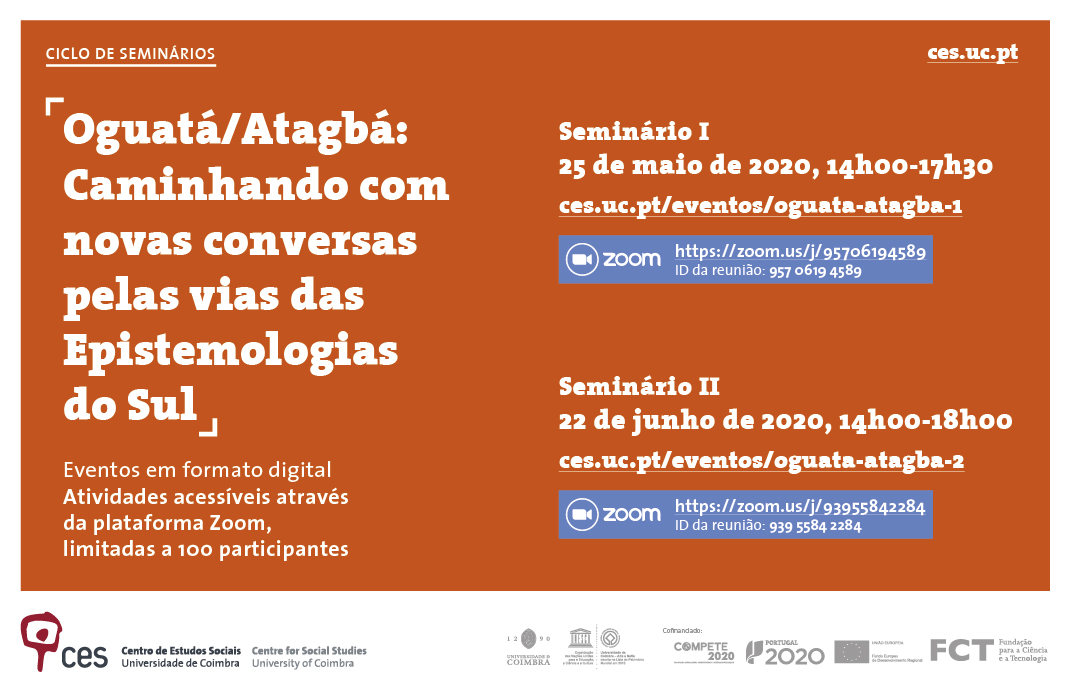Seminar
Oguatá/Atagbá: Walking with new conversations along the routes of Epistemologies of the South | Session I
May 25, 2020, 14h00-18h00 (GMT +01:00)
Online Event
The Oguatá | Atagbá Seminar Series: Walking with new conversations through the epistemologies of the south, it is an event proposed and organised by a group of researchers, linked to CES/UC, with an interest in the theme of "University Outreach". Based on the outreach praxis, the collective proposes seminar series to present the outreach work developed by the group members in their respective institutions, with the purpose of promoting the critical and reflective training of the participants and valuing University Outreach as a space for creation, recreation and decolonization of knowledge, inseparable from teaching and research.
This Seminar Series is the result of activities promoted by the outreach collective ATAGBÁ, which aims to carry out political-academic debates aimed at valuing the University and Popular Outreach, promoting exchanges of outreach experiences and carrying out network interventions in university institutions in Brazil and Portugal, guided by dialogue and the joint will to build knowledge based on a University/Society relationship committed to overcoming social inequalities, patriarchy and colonialism, as well as defence and socio-environmental preservation and in favour of cultural diversity.
Programme
2:00 pm to 2:30 pm
Title: The construction of popular plans as a strategy of resistance to hegemonic urban projects
Speaker: Alex Ferreira Magalhães
Overview: The reflection is about the methodology of building outreach projects, particularly regarding the type of interaction established between university and social agents rooted in low-income communities, the outreach's frequent 'target audience'. It problematizes experiences of projects that aim to strengthen vulnerable social categories, but that are not of their own initiative, being proposed "from the outside", posing the problem of legitimizing the project within the 'beneficiaries'. It addresses the role of each agent involved and the constitution of 'communities' as the subject of the actions carried out. Such a dilemma is often placed in outreach experiences, as well as in similar spheres, such as the role of NGOs. The proposal is to revisit it under the framework of epistemologies of the south, in order to postulate references to (re)structure current actions and future.
Bio Note: Professor at the Federal University of Rio de Janeiro; Post-Doctoral Researcher at CES; area of study: Urban Law; Favelas; Slums; Land; CPLP.
2:30 pm to 3:00 pm
Title: Masters of knowledge and university: Scenic-poetic-musical traditions of Bahia's Recôncavo (Proext-MEC, UFBA / UNEB)
Speaker: Eloísa Leite Domenici
Overview: The activities of this project sought to create relationships of mutual intelligibility between the university and traditional communities in interactions with masters, artistic groups, teachers and students. It works on the ecology of knowledges and intercultural translation, two procedures with which Epistemologies of the South are built.
Bio Note: Eloísa Domenici is Associate Professor at the Federal University of Southern Bahia (UFSB), PhD in Communication and Semiotics at the Pontifical Catholic University of São Paulo (PUC/SP, Brazil), artist of Dance and researcher of the so-called Brazilian popular manifestations, focusing on local bodies and epistemologies.
3:00 to 3:30
Title: Interprofessionality in Health in the state of Alagoas: challenges to integration Teaching/Service/Management/Community at UNCISAL, UFAL and SMS Maceió.
Speaker: Emilene Andrada Donato
Presentation: The consistent experiences that articulated Teaching-Management-Research-Outreach will be presented, finding principles concerning the ecology of knowledges and the abyssal line from the context of the Education through Work for Health Programme - PET Saúde GRADUASUS 2016-2018 from UFAL, due to the strategy of the National Programme for the Reorientation of Professional Training in Health (PRÓ-SAÚDE), in implementation in the country since 2005.
Bio Note: Professor at the University of Health Sciences of the State of Alagoas (UNCISAL) and visiting doctoral student at CES at the University of Coimbra.
3:30 pm to 4:00 pm
Title: Nosso Ateliê Animado - Art Workshop for Children
Speaker: Mauricio Virgulino Silva
Presentation: Nosso Ateliê Animado - Ateliê de Artes para Crianças is an outreach action linked to an undergraduate discipline for teacher training at ECA/USP, which serves children aged 6 to 11 years. A presentation of the experience that happened in the 1st semester of 2015, with 20 children and students of Educommunication and Pedagogy, who developed a project called Imaginary Beings, working with different artistic languages and that can establish a better educommunicative ecosystem.
Bio Note: Mauricio Silva, PhD student in Arts at PPGAV/ECA/USP, Visiting PhD student at CES/UC, Degree in Educommunication (ECA /USP).
16h00 to 16h30
Title: Ojapo Tape Oguata Hina: One Makes Way When Walking. Ecology of Knowledges and University Outreach.
Speaker: Célia Maria Foster Silvestre
Overview: Based on teaching, research and outreach activities between the Kaiowá and Guarani (MS, Brazil), the place of university outreach in the production of knowledges and its validity for an ecology of knowledges in Social Sciences, in the south/south perspective, are evaluated.
Bio Note: Célia Maria Foster Silvestre is a professor at the State University of Mato Grosso do Sul, Brazil, in a post-doctoral internship at CES / UC, developing research with the theme Colonialism, law and teko porã (well living): for a kaiowá epistemology and guarani.
4:30 pm to 5:00 pm
Title: Laikos, an experience of confronting religious intolerance and racism in Bahia.
Speaker: Saskya Miranda Lopes
Overview: The proposal is to present the trajectory of the Laikos university outreach project, of the UESC Law course (Ilhéus-Bahia) in defense of the secular state and of material equality between people in the Brazilian state. Situate the problem of racism and religious racism in Brazil and Bahia, the state with the largest black population in the country.
Bio Note: Saskya Lopes is Assistant Professor in the Department of Legal Sciences at the State University of Santa Cruz (UESC) and a doctoral student in Human Rights in Contemporary Societies at the University of Coimbra
5:30 pm to 6:00 pm– Comments and Closing


